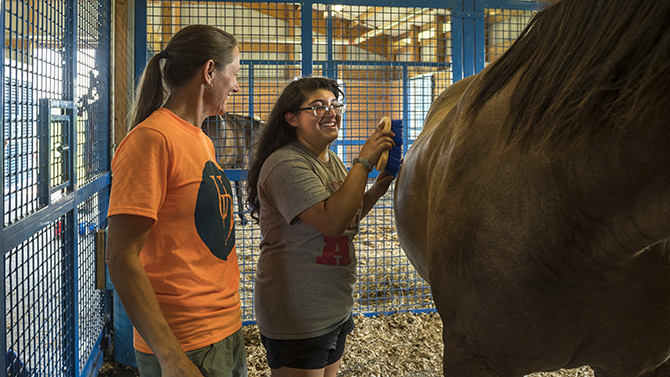


Early agricultural education
Photo by Kathy F. Atkinson September 06, 2016
High school students get hands-on experience at UD’s Webb Farm
For six weeks over the summer, students from William Penn High School in New Castle, Delaware, had the opportunity to learn the ins and outs of agriculture thanks to a partnership between the high school and the University of Delaware’s College of Agriculture and Natural Resources (CANR).
The idea was facilitated by Brian Erskine, principal of William Penn, and is now led by Mike Popovich, natural resource manager at CANR, and Kathleen Pickard and Karen Ferrucci, William Penn High School Agriculture Teachers and Penn Farm Summer Program Coordinators.
The students visited every Wednesday to learn something new within CANR, such as how to milk a cow, manage poultry and make ice cream. The work at UD was complementary to their summer work routine at Historic Penn Farm, where they manage a four-acre vegetable plot.
As part of the program, the students also toured UD’s Webb Farm and had a scavenger hunt where they got to know the animals around the farm and discovered all that the farm has to offer, such as a registered Angus cattle herd, a flock of Dorset sheep and an equine herd.
They then were introduced to the delicate process of ice cream making, led by Rolf Joerger, associate professor in the Department Animal and Food Sciences, and Melinda Shaw, manager of the UDairy Creamery.
The students were shown the science behind getting ice cream just right, and the creamery tour gave the students a little taste of food science, as they learned the ingredients and the science that goes into making ice cream.
Through the summer program, students learned all about the opportunities available at CANR. “William Penn’s developed agriculture program is unique in northern Delaware. We are fortunate to have the opportunity to allow for exploration of the curriculum we have here at the college. Our hope is that this is the first step in a much larger partnership,” said Popovich.
“For me, it is just an awareness of what we have to offer here. Not only do we have a farm, but also the scale and variety, and the welcoming atmosphere,” said Amy Biddle, assistant professor of animal and food sciences, who helped host the Webb Farm visit on July 27. “Once you meet the people, it becomes more real to the students – they can recall professors and students that they’ve met.”
At William Penn High School, between 300-350 students are enrolled in the Agriculture Program during the school year. In the summer, those students working on the farm are paid interns through a cooperation with New Castle County.
Students are introduced to agriculture through an introductory agriculture class, where they learn the basics of agriculture. If that piques their interest, they can take more classes related to areas of plant and animal science, such as equine science.
As they take more classes, students are eventually introduced to Historic Penn Farm, located adjacent to the high school in New Castle, where they get hands-on practice with farming. Students learn germination, husbandry, and harvesting techniques.
“I think it’s cool for them to see the application of what they have been taught in class being put to use. Being a UD alumnus myself, I use a lot of stories for examples, and for them to be able to see everything put into action is definitely very exciting,” said Ferrucci.
Laura Hernandez, a junior at William Penn and vice president of the school’s FFA chapter, only knew how to start a basic garden until she started taking the agriculture classes at the school and fell in love with the field.
“I’ve always loved animals. I had birds, dogs, even chickens at one point. I found out the school had an Intro to ag class, took the class, and the teacher encouraged me to join FFA. I became secretary sophomore year and now I’m going to become vice president for my upcoming junior year,” said Hernandez.
Hernandez hopes to continue pursuing agriculture and eventually have a career with animals, looking to have her own traveling veterinary business for farm animals.
Not only do students learn about farming on Historic Penn Farm, they also get community service experience as well. With the produce they harvest, the vegetables are prepared and preserved for use in their own cafeteria, the community summer feed programs, as well as use in William Penn’s culinary courses.
The remainder of the produce goes toward community supported agriculture (CSA), where shareholders pay a one-time fee and in exchange receive a bag of freshly harvested items every Tuesday for the entire summer.
“It’s important for them to realize just how much agriculture has to offer and plays a part in our everyday lives: biosecurity, health, technology. Also, getting all the hands-on experience really helps the students realize what they want to do, and also gives them the confidence for dealing with animals and everything else. They deal with something hands-on almost every day – farm equipment, animals – they use it and love it every day,” said Ferrucci.
The following summer research students assisted Biddle and helped to make the William Penn visits possible: Justin Berg, a senior in UD’s College of Arts and Sciences, Brian Chambers, a CANR senior, Hailey Siegel, a CANR senior; Haley Nelson, a CANR senior; Maryn Jordan, a CANR senior; Tesa Stone, a CANR sophomore; and James Madlock and Greg Patterson, both of Cheyney University.
Contact Us
Have a UDaily story idea?
Contact us at ocm@udel.edu
Members of the press
Contact us at 302-831-NEWS or visit the Media Relations website

